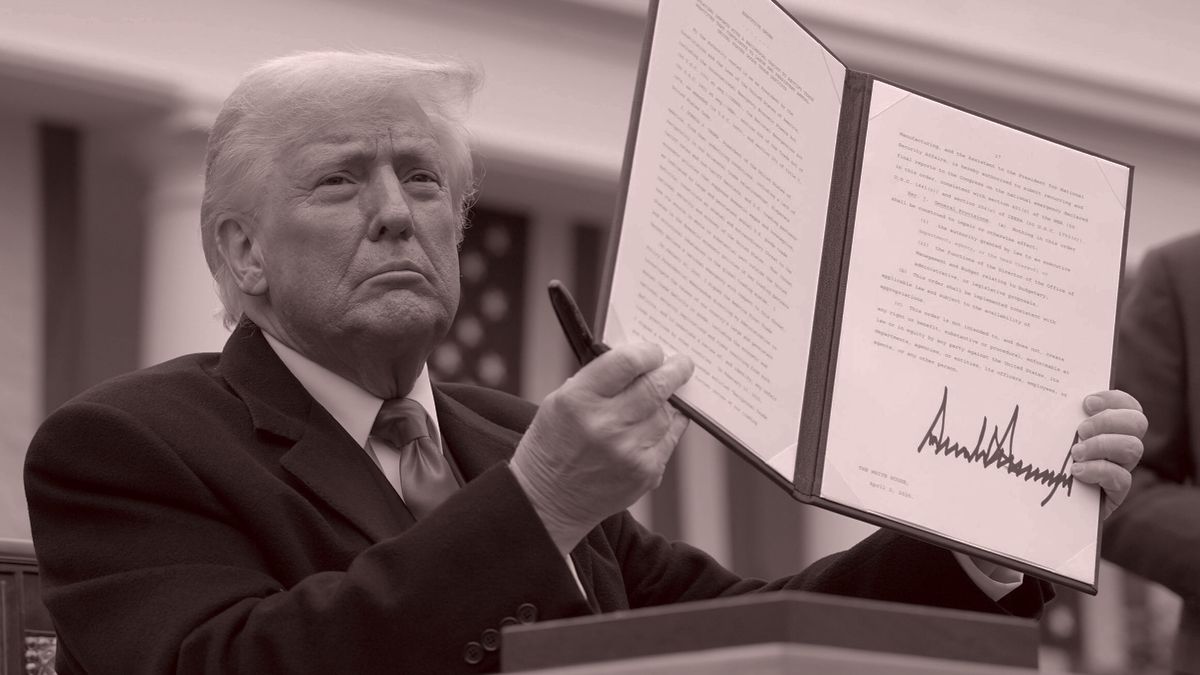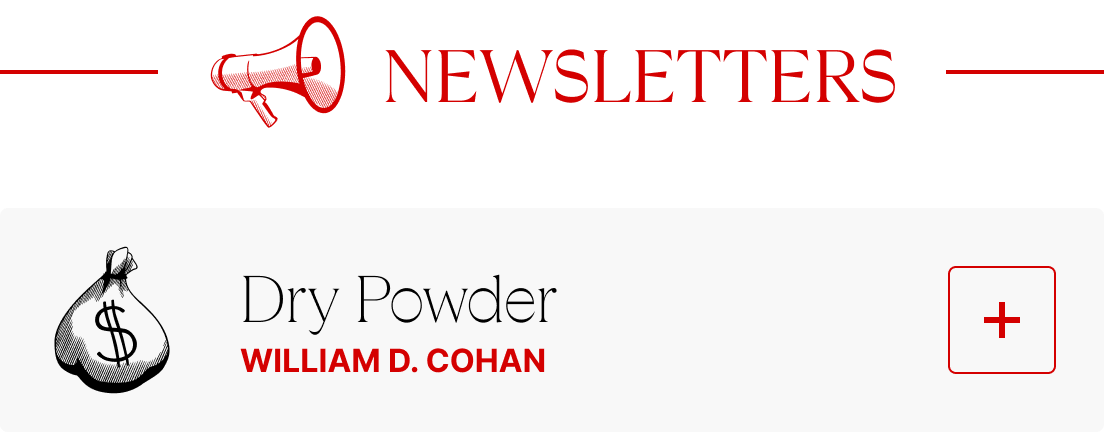Hello and welcome back to The Best & The Brightest, Liberation Day edition. I’m
Leigh Ann Caldwell, writing to you shortly after Donald Trump’s Rose Garden speech announcing his minimum 10 percent global tariff, plus higher, “reciprocal” import taxes on ne’er-do-well countries like Liechtenstein (37 percent), Vietnam (46 percent), and Lesotho (50 percent!). The full list is being rolled out on the president’s Truth Social page.
Trump believes his new suite of tariffs will mark a great day for the American economy. Most economists, corporate C.E.O.s, and even Republicans in Washington beg to differ. There’s a lot of finger-crossing and hoping that everything will turn out okay, which is the subject of today’s column.
But first, some notes on Johnson’s proxy voting debacle, and John Heilemann on Elon’s bad night in Wisconsin…
|
- Johnson’s parental crisis: Speaker Mike Johnson has faced many challenges with his razor-slim Republican majority, but few expected that a rank-and-file novice could cause so much damage. For those who haven’t been following this drama, Johnson tried to use his political muscle to defeat an effort by Rep. Anna Paulina Luna, a conservative Florida Republican, who wants new parents to be able to vote remotely for the first 12
weeks after the birth of their kid. Over the past several days, Johnson urged Republicans to defeat Luna’s measure; told them that proxy voting is unconstitutional (a position many Republicans disagree with); said it would diminish the institution of the House (a position many do agree with); and even tried to change the rules of the House to defeat it. Still, Luna and eight Republicans defied Johnson, bringing floor activity to a halt until next week.
Johnson isn’t planning to
back down, according to three people familiar with the latest discussions. Siding with the hard-line Freedom Caucus, the group most likely to threaten his speakership, he’ll likely force the same vote over and over again until he defeats Luna’s effort, delaying the party’s actual agenda.
Of course, this episode is yet another sign of Johnson’s struggle to keep his conference together when Trump doesn’t weigh in. Many members are on Johnson’s side, and believe that proxy voting for
new moms is a slippery slope. But plenty of Republicans are mystified that Johnson is taking such a defiant stand here, especially when Luna’s bill could have been an easy way to help change the perception that anti-abortion Republicans do little to help families. As one Republican member told me today, Johnson built up 19 months of wins and threw it all away in one day.
|
|
|
A MESSAGE FROM OUR SPONSOR
|
In America, farming isn’t just a profession; it’s a purpose. With 880 million acres of farmland and
more than 2 million people dedicated to producing our food in America, farmers are the backbone of our economy. In communities nationwide, Bayer employees work alongside farmers to bring cutting-edge innovations in breeding, crop protection, and technology to their fields. American farmers trust our tools because we have a purpose, too: helping farmers thrive.
Learn more at Go.Bayer.com/Purpose.
|
|
|
Now, here’s Heilemann on Elon’s faceplant in Wisconsin…
|
|
|

|
John Heilemann
|
|
Elon Crash Lands in Wisconsin
|
As far as most casual observers are concerned, Elon Musk jumped into
the national political arena—and when I say jumped, I mean jumped, baring a blinding expanse of alabaster-white belly—almost exactly six months ago, in Butler, Pennsylvania, when he made his first appearance at a Donald Trump rally. Six months later, this past Sunday night, Musk was
at it again: hopping, skipping, and flapping his arms at a campaign event in Green Bay. Only this time, Trump was nowhere to be seen; nor was Brad Schimel, the Wisconsin Supreme Court candidate Musk was ostensibly there to stump for. In fact, in the two hours Musk spent onstage, which began with him donning a foam Packers cheesehead hat,
he barely mentioned Schimel, instead holding forth about Social Security fraud, global birth rates, and A.I.
Among political professionals in both parties, the Musk event cemented a consensus about the state of play in the Badger State on election eve: that, on top of Musk’s odd habit of jumping up and down, this might be the moment, as one Republican strategist put it, “when Elon jumps the shark.” By the time voting started on Tuesday morning, the conventional wisdom had firmly set in
that Schimel was all but certain to lose to his opponent, Susan Crawford, by somewhere between 2 and 5 points. In fact, the White House political shop had reached this conclusion a week earlier, which helps explain why Trump ignored the pleas of senior Wisconsin Republicans, including former Governor Scott Walker, that he fly in and campaign for Schimel.
Yet no one in Trumpworld or the G.O.P. writ large expected that the race would be called so early,
that the margin would ultimately stretch to double digits (55-45), or that the repudiation of Musk would be so total and unequivocal. “It’s no secret that Elon has liabilities, but I don’t think we appreciated how serious they are,” a Republican consultant who works closely with the White House told me. “We knew we were going to get beat; we didn’t know we were going to get stomped.”
|
In their public statements after the race was called, Democrats struck a tone that
hovered tentatively between triumphal and relieved. “In a moment of national darkness, Wisconsin voters lit a candle,” said state Democratic Party chair Ben Wikler. “Let the lesson of Wisconsin’s election ring out across the country: Hope is not lost, democracy can yet survive, and the voice of the American people will not be silenced.”
But what also came through was that Wikler and his people were far less surprised by what went down than their Republican counterparts
were. Wikler, one of the savviest and most dialed-in political mechanics in the party, was a key author of a strategy centered on essentially ignoring Trump (no mean feat) and focusing exclusively on Musk, whose ever-escalating spending on the race made the rallying cry that Democrats embraced more resonant by the day: “Wisconsin is not for sale!” By the end, Wikler et al. could see signs in their data that a wave was building, though its scale and sweep were less clear. Yet even the most
bullish among them were stunned by their success at driving turnout through the roof—to roughly 2.4 million voters, a staggering number for an off-year race and just a couple hundred thousand shy of the norm in Wisconsin for a midterm election.
You might think Republicans would be furiously spinning the notion that their twin special election victories in Florida’s 1st and 6th congressional districts (to fill the seats previously held by Matt Gaetz and
Mike Waltz, respectively) balanced out the loss in Wisconsin. But their efforts in that vein have been perfunctory, and it’s not hard to see why. Sure, with a vanishingly small House majority, holding on to those seats was imperative. And yes, from Trump’s P.O.V., it’s surely pleasing that the two replacements, Jimmy Patronis and Randy Fine, will be as slavishly loyal to him as Gaetz and Waltz. (“My constituents … want me to go up and be a
warrior for President Trump, and that’s what I intend to do,” Fine proclaimed the other day.)
But any half-sane and modestly numerate Republican understands that the Florida results offer cold comfort. Just a few months ago, after all, Trump carried FL-01 by 37 points and FL-06 by 30, but Patronis won by just 15 and Fine by 14, meaning that the G.O.P.’s strength in both districts has been cut in half. And as Hakeem Jeffries told anyone in earshot last night, there are 55
House Republicans in districts Trump claimed by less than 15 points—reason for the members in those places to have a creeping case of the heebie-jeebies about the G.O.P.’s rapid political erosion since last fall.
Continue reading online…
|
|
|
And finally, the main event…
|
As Trump’s tariff Mardi Gras comes to a close, Republicans are
scratching their heads over their options, the Senate is looking to have Canada’s back, and the White House insists they’re not screwing around. What could possibly go wrong?
|
|
|
About 24 hours before Donald Trump was set to announce his sweeping
global tariffs, Treasury Secretary Scott Bessent met with a group of House Republicans for a get-to-know-you session. Alas, the new levies, the cornerstone of the president’s economic vision, were the last thing he wanted to talk about. At one point during the Tuesday conversation, which was moderated by Rep. Lisa McClain, Bessent got three questions, including one about tariffs. He answered the other two. When McClain reminded him about the third, he
chuckled, and said he thought he’d gotten out of answering it, per one member who attended the event.
|
|
|
A MESSAGE FROM OUR SPONSOR
|
The heartbeat of American agriculture can be heard at every farmer’s market and dinner table,
spanning 880 million acres, supported by over 2 million people, and contributing $1.5 trillion to our economy.
Thousands of Bayer employees work alongside American farmers, providing access to innovations and support to implement them effectively. Bayer’s advanced breeding, crop protection, and digital technology tools are reshaping the future of farming, and we’re invested in every field, acre, and
harvest. We share the same purpose as American farmers: helping agriculture thrive so we can bring high-quality, abundant, and diverse food to millions. Learn more at Go.Bayer.com/Purpose.
|
|
|
In many ways, the lead-up to Trump’s Rose Garden tariff rollout, which the president
had hyped for weeks as “Liberation Day,” felt like a throwback to his first administration, defined by last-minute scrambling and uncertainty. For weeks, Republicans lived in angst-filled anticipation over how expansive and steep the tariffs would be, their anxiety exacerbated by the lack of insight received in advance—beyond ominous rumors about the anticipated “shock and awe” of it all. When I asked House Speaker Mike Johnson this week whether Trump should actually go through
with the tariffs, he never gave a definitive “yes,” but said that he “trusts the president’s instincts on the economy.” After a beat he added, “We’ll see how it all develops.”
The information vacuum left Republican lawmakers with few solid talking points, even as Democrats hammered them on potential price hikes for farmers, small business, manufacturers, and consumers. Also complicating their strategic calculus: Few wanted to go out on a limb to criticize the president when he might have
been bluffing with trading partners or might modulate his plans at any moment. On Monday, a White House aide told Senate staffers that they would receive a briefing ahead of Trump’s announcement, I’m told. But the briefing never happened. Indeed, Republican leaders in both chambers received no details about Liberation Day until shortly before the event began. Bessent met with Senate Republicans earlier on Wednesday to talk about the budget and spending, but provided only a brief and broad
overview of Trump’s tariff plans.
Trump did finally reveal specific tariff numbers in his freewheeling Rose Garden speech, as promised, including an immediate 10 percent levy on all imported goods globally, plus higher “reciprocal” tariffs on nearly 50 of what he called “the worst offenders”—or countries that have imposed their own barriers on U.S. trade. These are on top of a 25 percent tariff on Canadian goods, a 20 percent tariff on products from China, and 25 percent
automobile tariffs, set to start tomorrow.
|
Republicans now have some clarity, but tariffs could become the first point of real
tension between Trump and his party. Yes, yes, Republicans are ostensibly fully supportive of the president wielding tariffs as a threat to coerce countries to comply with his economic and policy demands. The party of free trade, after all, has mostly come around to Trump’s view that temporary reciprocal tariffs are a necessary corrective—“a positive development,” as Senator John Cornyn put it, to create trade equity. But temporary is the key word. “If we get in a
trade war, that’s when we have trouble,” one House Republican said. Many worry that Trump’s pro-tariff trade advisor, Peter Navarro, who has the most influence over Trump on the issue, is operating without any pushback in the White House. On Sunday, Navarro said tariffs would raise $6 trillion in revenue over the next decade. The Wall Street Journal editorial board
argued that this figure would be equivalent to a $600 billion-a-year tax increase on Americans.
|
|
|
From the Rose Garden, Trump implied that the new tariffs might be a tool to
get other countries to drop their own trade restrictions on the United States. But some Republican members have suggested that if the tariffs are made permanent, and either voters or the stock market rebels, they’ll take action against them. (I’ll believe it when I see it.) When I asked one Republican House member whether Speaker Johnson, whose success depends on Trump, would ever put forward a vote that overturns Trump’s tariffs, the member said that anything was possible. But the
reality is that Republican leadership undercut that possibility earlier this year after they slipped a measure into a procedural rule that would prohibit a snap vote to overturn them.
The Senate, meanwhile, passed a bipartisan bill today that would undo the 25 percent tariff Trump imposed on Canada by ending the national emergency Trump declared to justify it. Maine’s Susan Collins—whose state’s economy is intertwined with neighboring Canada, and has expressed
her concerns to Vice President J.D. Vance—announced her support for the bill today, saying on the floor that the tariffs were “detrimental” to Maine’s families and businesses. Kentucky’s Mitch McConnell backed it, too—fellow Kentuckian Rand Paul was a co-sponsor—as did Alaska’s Lisa Murkowski. In a middle-of-the-night social media post, Trump
assailed the bill’s likely Republican supporters as “playing with the lives of the American people, and right into the hands of the Radical Left Democrats and Drug Cartels.”
Democrats, for their part, have seized on “Liberation Day” as an opportunity to attack, with the party already in a buoyant mood after tightening the margins in special congressional
elections in two extremely red Florida districts yesterday, and winning a Wisconsin Supreme Court race. Party members have condemned the tariffs for their potential negative economic impacts, pointing to studies saying they will cost families around $5,000 per year—just as Republicans are making incremental progress to extend Trump’s 2017 tax cuts. Prior to Trump’s announcement, Senate Democratic Leader Chuck Schumer blasted what he called Trump’s “absurd, crazy chaotic trade
war” at a press conference, flanked by a map purporting to show economic losses across the country. His Republican colleagues, he said, “don’t like the tariffs either.”
|
|
|
Join Emmy Award-winning journalist Peter Hamby, along with the team of expert journalists at Puck, as they let you
in on the real conversations insiders are having across the four corners of power in America: Wall Street, Washington, Silicon Valley and Hollywood. Puck’s contributors will bring you smart conversation around the inside stories happening in these worlds. Presented in partnership with Audacy, new episodes publish daily, Monday-Friday.
|
|
|
Unique and privileged insight into the private conversation going on inside Wall Street, as told by the
best-selling journalist and former M&A banker.
|
|
|
Need help? Review our FAQ page or contact us for assistance. For brand partnerships, email ads@puck.news.
You received this email because you signed up to receive emails from Puck, or as part of your Puck account associated with . To stop receiving this newsletter and/or manage all your email preferences,
click here.
|
Puck is published by Heat Media LLC. 107 Greenwich St, New York, NY 10006
|
|
|
|



























